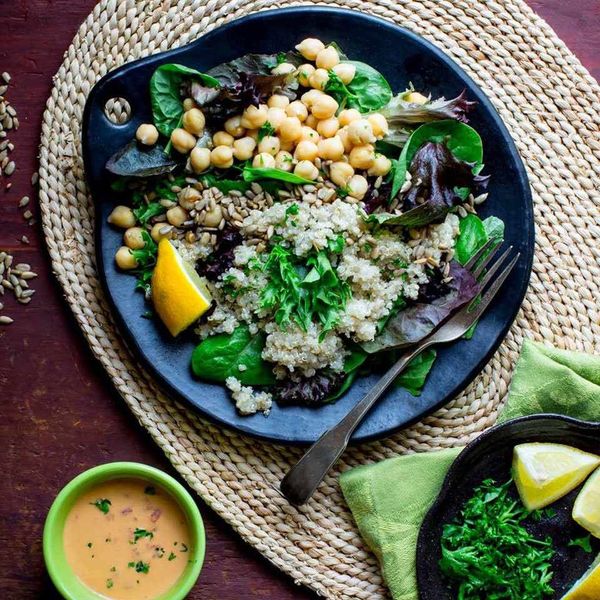
This hearty vegan salad is loaded with plant-based power ingredients: chickpeas, quinoa and hummus. We love the crunch of the sunflower seeds and the unexpected flavor of roasted peppers.
Updated on April 22, 2024
Cook Mode
(Keep screen awake)
Ingredients
-
2 tablespoons hummus, original or roasted red pepper flavor
-
1 tablespoon lemon juice
-
1 tablespoon chopped roasted red pepper
-
2 cups mixed salad greens
-
½ cup cooked quinoa
-
½ cup chickpeas, rinsed
-
1 tablespoon unsalted sunflower seeds
-
1 tablespoon chopped fresh parsley
-
Pinch of salt
-
Pinch of ground pepper
Directions
-
Stir hummus, lemon juice and red peppers in a small dish. Thin with water to desired consistency for dressing.
-
Arrange greens, quinoa and chickpeas in a large bowl. Top with sunflower seeds, parsley, salt and pepper. Serve with the dressing.
Originally appeared: EatingWell.com, August 2017
Nutrition Facts (per serving)
| 379 | Calories |
| 11g | Fat |
| 59g | Carbs |
| 16g | Protein |
| Nutrition Facts | |
|---|---|
|
Servings Per Recipe 1 |
|
|
Serving Size 3 1/2 cups |
|
|
Calories 379 |
|
| % Daily Value * | |
|
Total Carbohydrate 59g |
21% |
|
Dietary Fiber 13g |
47% |
|
Total Sugars 3g |
|
|
Protein 16g |
32% |
|
Total Fat 11g |
13% |
|
Saturated Fat 1g |
7% |
|
Vitamin A 4185IU |
84% |
|
Vitamin C 45mg |
50% |
|
Folate 300mcg |
75% |
|
Sodium 607mg |
26% |
|
Calcium 139mg |
11% |
|
Iron 6mg |
32% |
|
Magnesium 156mg |
37% |
|
Potassium 892mg |
19% |
Nutrition information is calculated by a registered dietitian using an ingredient database but should be considered an estimate.
* Daily Values (DVs) are the recommended amounts of nutrients to consume each day. Percent Daily Value (%DV) found on nutrition labels tells you how much a serving of a particular food or recipe contributes to each of those total recommended amounts. Per the Food and Drug Administration (FDA), the daily value is based on a standard 2,000 calorie diet. Depending on your calorie needs or if you have a health condition, you may need more or less of particular nutrients. (For example, it’s recommended that people following a heart-healthy diet eat less sodium on a daily basis compared to those following a standard diet.)
(-) Information is not currently available for this nutrient. If you are following a special diet for medical reasons, be sure to consult with your primary care provider or a registered dietitian to better understand your personal nutrition needs.

Leave a Reply